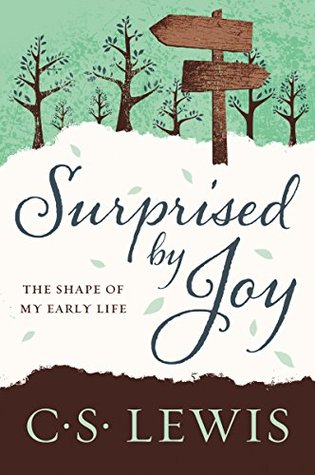More on this book
Community
Kindle Notes & Highlights
by
C.S. Lewis
Read between
January 17 - January 17, 2020
It is not settled happiness but momentary joy that glorifies the past.
it is that of an unsatisfied desire which is itself more desirable than any other satisfaction. I call it Joy, which is here a technical term and must be sharply distinguished both from Happiness and from Pleasure. Joy (in my sense) has indeed one characteristic, and one only, in common with them; the fact that anyone who has experienced it will want it again.
I doubt whether anyone who has tasted it would ever, if both were in his power, exchange it for all the pleasures in the world. But then Joy is never in our power and pleasure often is.
With my mother’s death all settled happiness, all that was tranquil and reliable, disappeared from my life. There was to be much fun, many pleasures, many stabs of Joy; but no more of the old security. It was sea and islands now; the great continent had sunk like Atlantis.
Hence while friendship has been by far the chief source of my happiness, acquaintance or general society has always meant little to me, and I cannot quite understand why a man should wish to know more people than he can make real friends of.
Joy is distinct not only from pleasure in general but even from aesthetic pleasure. It must have the stab, the pang, the inconsolable longing.
Even in peace-time I think those are very wrong who say that schoolboys should be encouraged to read the newspapers. Nearly all that a boy reads there in his teens will be known before he is twenty to have been false in emphasis and interpretation, if not in fact as well, and most of it will have lost all importance. Most of what he remembers he will therefore have to unlearn; and he will probably have acquired an incurable taste for vulgarity and sensationalism and the fatal habit of fluttering from paragraph to paragraph to learn how an actress has been divorced in California, a train
...more
Joy is not a substitute for sex; sex is very often a substitute for Joy. I sometimes wonder whether all pleasures are not substitutes for Joy.
What I like about experience is that it is such an honest thing. You may take any number of wrong turnings; but keep your eyes open and you will not be allowed to go very far before the warning signs appear. You may have deceived yourself, but experience is not trying to deceive you. The universe rings true wherever you fairly test it.
It was here that I first read a volume of Chesterton’s essays. I had never heard of him and had no idea of what he stood for; nor can I quite understand why he made such an immediate conquest of me. It might have been expected that my pessimism, my atheism, and my hatred of sentiment would have made him to me the least congenial of all authors. It would almost seem that Providence, or some ‘second cause’ of a very obscure kind, quite over-rules our previous tastes when It decides to bring two minds together. Liking an author may be as involuntary and improbable as falling in love. I was by now
...more
A young man who wishes to remain a sound Atheist cannot be too careful of his reading. There are traps everywhere—‘Bibles laid open, millions of surprises,’ as Herbert says, ‘fine nets and stratagems.’ God is, if I may say it, very unscrupulous.
Then I read Chesterton’s Everlasting Man and for the first time saw the whole Christian outline of history set out in a form that seemed to me to make sense. Somehow I contrived not to be too badly shaken. You will remember that I already thought Chesterton the most sensible man alive ‘apart from his Christianity’. Now, I veritably believe, I thought—I didn’t of course say; words would have revealed the nonsense—that Christianity itself was very sensible ‘apart from its Christianity’.
Really, a young Atheist cannot guard his faith too carefully. Dangers lie in wait for him on every side. You must not do, you must not even try to do, the will of the Father unless you are prepared to ‘know of the doctrine’. All my acts, desires, and thoughts were to be brought into harmony with universal Spirit.
Doubtless, by definition, God was Reason itself. But would He also be ‘reasonable’ in that other, more comfortable, sense? Not the slightest assurance on that score was offered me. Total surrender, the absolute leap in the dark, was demanded.
In the Trinity Term of 1929 I gave in, and admitted that God was God, and knelt and prayed: perhaps, that night, the most dejected and reluctant convert in all England.
That is why, though it was a terror, it was no surprise to learn that God is to be obeyed because of what He is in Himself. If you ask why we should obey God, in the last resort the answer is, ‘I am.’ To know God is to know that our obedience is due to Him. In His nature His sovereignty de jure is revealed.


